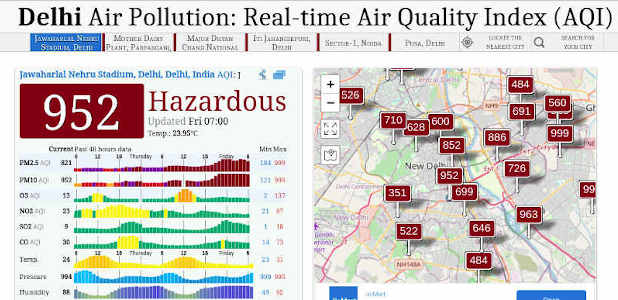Delhi Pollution: How Digital Technology Can Help Protect the Planet

Delhi Air Pollution: The Real-time Air Quality Index (AQI) on November 5, 2021 shows hazardous air quality level in Delhi.
UNEP is contributing to that charge through a new programme on Digital Transformation.
As a thick haze descended over New Delhi during the recent days, air quality monitors across the Indian capital began to paint a grim picture. The smoke, fed in part by the seasonal burning of crops in northern India, was causing levels of the toxic particle PM2.5 to spike, a trend residents could track in real time on the Global Environment Monitoring System for Air (GEMS Air) website.
By early November, according to UNEP, GEMS Air showed that concentrations of PM2.5 outside New Delhi’s iconic India Gate were ‘hazardous’ to human health. In an industrial area north of the Indian capital, the air was 50 times more polluted.
GEMS Air is one of several new digital tools used by the United Nations Environment Programme (UNEP) to track the state of the environment in real time at the global, national and local levels. In the years to come, a digital ecosystem of data platforms will be crucial to helping the world understand and combat a host of environmental hazards, from air pollution to methane emissions, experts say.
Also Read:
[ Lethal Pollution Killing 150 People Everyday in Delhi ]
[ Spineless Supreme Court Fails to Tackle Pollution Problem in Delhi ]
[ UN HRC Petition to Protect Environmental and Human Rights of People in Delhi ]
[ Lethal Pollution Killing People in Delhi ]
[ Join and Support the Green Group of Delhi ]
“Various private and public sector actors are harnessing data and digital technologies to accelerate global environmental action and fundamentally disrupt business as usual,” says David Jensen, the coordinator of UNEP’s digital transformation task force. “These partnerships warrant the attention of the international community as they can contribute to systemic change at an unprecedented speed and scale.”
The world is facing what United Nations Secretary-General António Guterres has called a triple planetary crisis of climate change, pollution and biodiversity loss. Experts say averting those catastrophes and achieving the Sustainable Development Goals will require fundamentally transforming the global economy within a decade.
It’s a task that would normally take generations. But a range of data and digital technologies are sweeping the planet with the potential to promote major structural transformations that will enhance environmental sustainability, climate action, nature protection and pollution prevention.
UNEP is contributing to that charge through a new programme on Digital Transformation and by co-championing the Coalition for Digital Environmental Sustainability as part of the Secretary-General’s Digital Cooperation Roadmap.
UNEP studies show that for 68 percent of the environment-related Sustainable Development Goal indicators, there is not enough data to assess progress. The digital initiatives leverage technology to halt the decline of the planet and accelerate sustainable finance, products, services, and lifestyles.
GEMS air was among the first of those programmes. Run by UNEP and Swiss technology company IQAir, it is the largest air pollution network in the world, covering some 5,000 cities. In 2020, over 50 million users accessed the platform and its data is being streamed into digital billboards to alert people about air quality risks in real time. In the future, the program aims to extend this capability directly into mobile phone health applications.
Building on lessons learned from GEMS Air, UNEP has developed three other lighthouse digital platforms to showcase the power of data and digital technologies, including cloud computing, earth observation and artificial intelligence.














